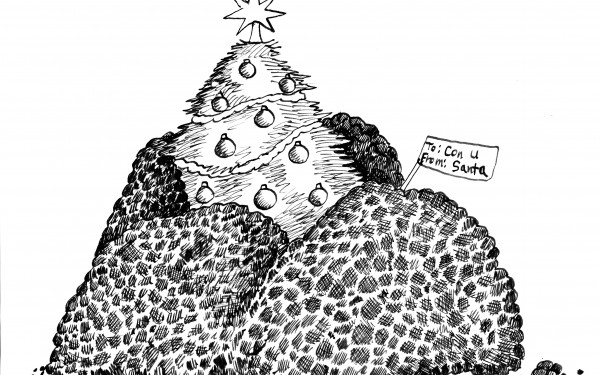Editorial
The Art of Grandstanding
The concept was ‘grandstanding.’
Grandstanding is a verb that connotes someone is putting on a show, attempting to impress or seek approval. The person doing it desires attention from onlookers, spectators and media.
With so many important and necessary issues which students need to understand this semester, it’s unfortunate that we sometimes waste our time—and ink—covering what amounts to little more than petty politicking bullshit.
We’re pretty certain it’s going to take a whole lot more than isolated, attention-grabbing displays for students to accomplish anything in the weeks ahead. There isn’t much confidence from our end that grandstanding will necessarily preface lasting and effective policy change, quite honestly. Does it ever?
To get a sense of the prevalence of grandstanding at Concordia, why don’t we check out what’s up with the two branches of Concordia governance—student and admin.
The Concordia Student Union is mired deep in the trenches of the anti-tuition hike fight, but frankly, grandstanding will probably not work on the Liberal government of Quebec.
As we’ve seen, there hasn’t been much in the way of gains for the student collective since the Nov. 10 protest that saw 30,000 students on the street. As awesome as it was, one full-day display of “Fuck you, Charest” didn’t move mountains the way we hoped.
When the student groups banded together, it seemed as though communication and information was really getting out there—at least, for a time.
But grandstanding on Nov. 10 only took the student movement so far, and the reality is that it might not be an effective use of time for round two.
Alone, another huge protest cannot deliver what would, or could, make a second collective action different or more effective, or the murky Liberal budget more understandable. Sure, people paid attention on Nov. 10. But what are the necessary steps that generally precede lasting policy change, and how are we taking them?
Your guess is as good as ours.
The lines of communication seem to have gotten crossed at Concordia as well.
While posters cropping up in the hallways pretty much spell out the Concordia Student Union’s position on the hikes (hint: strike), the Provost has proclaimed deliberate actions in March will not hinder business (and classes) as usual in terms of university operations.
Sounds like this is going to be one heck of an exam period. Regardless of where your politics land, can we all agree that it’s pretty sad our governments came to their decisions on the matter seemingly without each other’s input?
Where are the panel discussions? The information sessions? The inter-governmental exchange necessary to take on such an important decision on either side? The fact that communication is absent is a troubling sign.
Now, what about the Board of Governors?
About a year ago, the highest governing body at this school was in crisis mode after unilaterally firing former president Judith Woodsworth.
Not anticipating the intense backlash and media scrutiny, the BoG called for an “open meeting” following an external governance report—ostensibly to help prove to the Concordia community the administrators on top would be more willing to communicate and cooperate in the months ahead.
Fast-forward to 2012: If recent Board meetings are any indication, the entire “open forum” spectacle was—oh yeah, you guessed it—grand-freakin’-standing.
Today, the BoG is essentially evading the community they had promised to engage with in the new year, rejecting motions that would create transparency and ensure that good governance is carried through.
Specifically, the almighty BoG and Senate defeated motions to have Board meetings filmed and streamed. This would ensure anyone could access them, while also holding individual members accountable to the public institution they claim to serve. These concepts, apparently, don’t interest the BoG.
All this to say, we see through your showy bravado, Concordia. This isn’t progress—it’s posturing.
And we deserve better.






